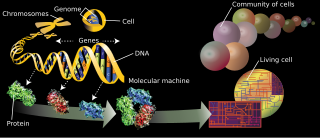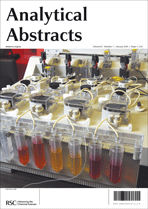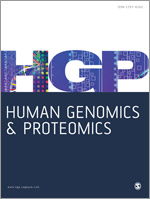
The proteome is the entire set of proteins that is, or can be, expressed by a genome, cell, tissue, or organism at a certain time. It is the set of expressed proteins in a given type of cell or organism, at a given time, under defined conditions. Proteomics is the study of the proteome.

Genomics is an interdisciplinary field of biology focusing on the structure, function, evolution, mapping, and editing of genomes. A genome is an organism's complete set of DNA, including all of its genes as well as its hierarchical, three-dimensional structural configuration. In contrast to genetics, which refers to the study of individual genes and their roles in inheritance, genomics aims at the collective characterization and quantification of all of an organism's genes, their interrelations and influence on the organism. Genes may direct the production of proteins with the assistance of enzymes and messenger molecules. In turn, proteins make up body structures such as organs and tissues as well as control chemical reactions and carry signals between cells. Genomics also involves the sequencing and analysis of genomes through uses of high throughput DNA sequencing and bioinformatics to assemble and analyze the function and structure of entire genomes. Advances in genomics have triggered a revolution in discovery-based research and systems biology to facilitate understanding of even the most complex biological systems such as the brain.

Proteomics is the large-scale study of proteins. Proteins are vital parts of living organisms, with many functions such as the formation of structural fibers of muscle tissue, enzymatic digestion of food, or synthesis and replication of DNA. In addition, other kinds of proteins include antibodies that protect an organism from infection, and hormones that send important signals throughout the body.

The branches of science known informally as omics are various disciplines in biology whose names end in the suffix -omics, such as genomics, proteomics, metabolomics, metagenomics, phenomics and transcriptomics. Omics aims at the collective characterization and quantification of pools of biological molecules that translate into the structure, function, and dynamics of an organism or organisms.

The SIB Swiss Institute of Bioinformatics is an academic not-for-profit foundation which federates bioinformatics activities throughout Switzerland.

Genome Research is a peer-reviewed scientific journal published by Cold Spring Harbor Laboratory Press. Disregarding review journals, Genome Research ranks 2nd in the category 'Genetics and Genomics' after Nature Genetics. The focus of the journal is on research that provides novel insights into the genome biology of all organisms, including advances in genomic medicine. This scope includes genome structure and function, comparative genomics, molecular evolution, genome-scale quantitative and population genetics, proteomics, epigenomics, and systems biology. The journal also features interesting gene discoveries and reports of cutting-edge computational biology and high-throughput biology methodologies. New data in these areas are published as research papers, or methods and resource reports that provide novel information on technologies or tools that will be of interest to a broad readership. The journal was established in 1991 as PCR Methods and Applications and obtained its current title in 1995. According to the Journal Citation Reports, the journal has a 2020 impact factor of 9.043, which peaked in 2014 at 14.630.
The Association of Biomolecular Resource Facilities (ABRF) is dedicated to advancing core and research biotechnology laboratories through research, communication, and education. ABRF members include over 2000 scientists representing 340 different core laboratories in 41 countries, including those in industry, government, academic and research institutions.

Annual Review of Biomedical Engineering is an academic journal published by Annual Reviews. In publication since 1999, this journal covers the significant developments in the broad field of biomedical engineering with an annual volume of review articles. It is edited by Martin L. Yarmush and Mehmet Toner. As of 2022, Journal Citation Reports gave the journal has an impact factor of 11.324, ranking it seventh out of 98 journals in the category "Biomedical Engineering". As of 2021, Annual Review of Biomedical Engineering is being published as open access, under the Subscribe to Open model.

Analytical Abstracts is a current awareness and information retrieval service for analytical chemistry, published by the Royal Society of Chemistry in Cambridge, United Kingdom. It was first published in the mid-1950s by the Society for Analytical Chemistry which merged with other societies in 1980 to form the Royal Society of Chemistry.

David S. Eisenberg is an American biochemist and biophysicist best known for his contributions to structural biology and computational molecular biology, a professor at the University of California, Los Angeles since the early 1970s and director of the UCLA-DOE Institute for Genomics & Proteomics since the early 1990s, as well as a member of the California NanoSystems Institute (CNSI) at UCLA.
The Pennington Biomedical Research Center is a health science-focused research center in Baton Rouge, Louisiana. It is part of the Louisiana State University System and conducts clinical, basic, and population science research. It is the largest academically-based nutrition research center in the world, with the greatest number of obesity researchers on faculty. The center's over 500 employees occupy several buildings on the 222-acre (0.90 km2) campus. The center was designed by the Baton Rouge architect John Desmond.

The American Society for Biochemistry and Molecular Biology (ASBMB) is a learned society that was founded on December 26, 1906, at a meeting organized by John Jacob Abel. The roots of the society were in the American Physiological Society, which had been formed some 20 years earlier. ASBMB is the US member of the International Union of Biochemistry and Molecular Biology.

George P. Rédei was a Hungarian plant biologist, professor, author and member of the Hungarian Academy of Sciences.
BMC Genomics is an open-access scientific journal covering all areas of genomics and proteomics. The journal was established in 2000 and is published by BioMed Central. The editor-in-chief is Matteo Pasini. Its 2021 impact factor is 4.56.
Systems Biology in Reproductive Medicine is a peer-reviewed medical journal that covers the use of systems approaches including genomic, cellular, proteomic, metabolomic, bioinformatic, molecular, and biochemical, to address fundamental questions in reproductive biology, reproductive medicine, and translational research. The journal publishes research involving human and animal gametes, stem cells, developmental biology, toxicology, and clinical care in reproductive medicine.
The Applied Microbiology and Biotechnology is a peer-reviewed biweekly journal publishes papers and mini-reviews of new and emerging products, processes and technologies in the area of prokaryotic or eukaryotic cells, relevant enzymes and proteins; applied genetics and molecular biotechnology; genomics and proteomics; applied microbial and cell physiology; environmental biotechnology; process and products and more.

Mark S. Boguski was an American pathologist specializing in computational analysis and structural biology, He was elected in 2001 to the U.S. National Academy of Medicine, and was a Fellow of the American College of Medical Informatics.
Shantanu Sengupta is an Indian cell biologist and a professor at the Institute of Genomics and Integrative Biology (IGIB) of the Council of Scientific and Industrial Research. At IGIB, he coordinates the activities of the National Facility for Biochemical and Genomic Resources (NFBGR) and the Proteomics and Structural Biology Unit of the institute. He is a member of the executive council of the Proteomic Society, India and is known for his studies of cardiovascular diseases from a genetic perspective as well as of Homocysteine with regard to its toxicity and its role in epigenetic modifications. His studies have been documented by way of a number of articles and ResearchGate, an online repository of scientific articles has listed 149 of them. The Department of Biotechnology of the Government of India awarded him the National Bioscience Award for Career Development, one of the highest Indian science awards, for his contributions to biosciences, in 2011.
Briefings in Functional Genomics is a bimonthly peer-reviewed scientific journal covering genomics. It was established in 2002 as Briefings in Functional Genomics & Proteomics, obtaining its current title in 2010. It is published by Oxford University Press and the editor-in-chief is Paul Hurd. According to the Journal Citation Reports, the journal has a 2020 impact factor of 4.241.
Jennifer Eileen Van Eyk is the Erika Glazer Chair in Women's Heart Health, the Director of Advanced Clinical Biosystems Institute in the Department of Biomedical Sciences, the Director of Basic Science Research in the Women's Heart Center, a Professor in Medicine and in Biomedical Sciences at Cedars-Sinai. She is a renowned scientist in the field of clinical proteomics.












